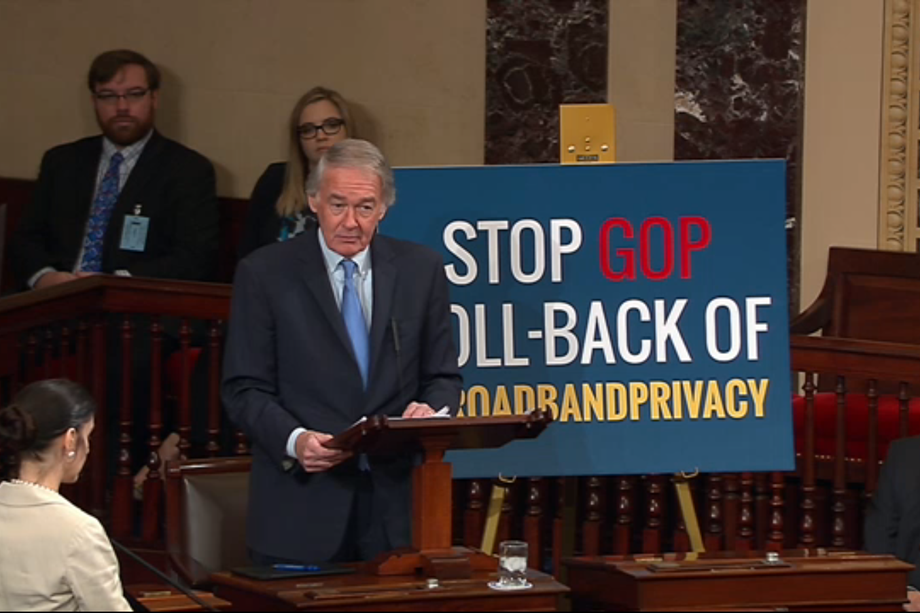US Senate Votes to Let Internet Providers Share Your Web Browsing History without Permission
WHISTLEBLOWING - SURVEILLANCE, 3 Apr 2017
Jacob Kastrenakes | The Verge – TRANSCEND Media Service
Just What No Consumer Asked For
23 Mar 2017 – The US Senate has voted to overturn consumer-friendly internet privacy rules that would have prevented internet providers from sharing your web browsing history without permission.
The privacy rules, passed last year by the FCC, required internet providers like Comcast, Verizon, and AT&T to get each customer’s permission before sharing personal information like which websites they visit. But internet providers want to be able to sell that data and use it to target ads, so they’ve been vocal about opposing the rules since around the time President Trump took office.
“This resolution is a direct attack on consumer rights.”
This vote uses the Congressional Review Act, which lets Congress strike down recently passed rules by federal agencies, to block the FCC’s action. It now heads to the House, where it’ll need another vote before the rules are wiped out.
“This resolution is a direct attack on consumer rights, on privacy, on rules that afford basic protection against intrusive and illegal interference with consumers’ use of social media sites and websites that often they talk for granted,” Senator Richard Blumenthal (D-CT) said in the Senate today ahead of the vote.
What makes this reversal particularly damaging is that it won’t just undo these privacy rules, but it’ll prevent the FCC from passing similar privacy rules in the future. That means that the FCC won’t be able to pass strict privacy rules again, even if opinions change in Congress.
Related: Landmark privacy rules are going to get killed because internet providers asked nicely
Assuming these rules get overturned, the FCC is going to have to formalize a new set of privacy requirements for internet providers. When that happens, it’s likely they’ll be quite similar to these rules — banning ISPs from sharing information on children or their subscribers’ health — but without the restriction on sharing general web browsing history, which is what internet providers are really up in arms about.
Republicans in both Congress and the FCC have been fighting for months to strip back these rules, asking that they be put more in line with the privacy framework established by the Federal Trade Commission. After passing its net neutrality order, the FCC took privacy enforcement away from the FTC, which is why it had to draw up its own set of restrictions. While the FCC hewed closely to the FTC’s guidelines, the few areas where it did diverge have clearly frustrated the industry they police.
Altogether, it’s just pure bad news for consumers, whose private data is about to be open for sale again.
DISCLAIMER: The statements, views and opinions expressed in pieces republished here are solely those of the authors and do not necessarily represent those of TMS. In accordance with title 17 U.S.C. section 107, this material is distributed without profit to those who have expressed a prior interest in receiving the included information for research and educational purposes. TMS has no affiliation whatsoever with the originator of this article nor is TMS endorsed or sponsored by the originator. “GO TO ORIGINAL” links are provided as a convenience to our readers and allow for verification of authenticity. However, as originating pages are often updated by their originating host sites, the versions posted may not match the versions our readers view when clicking the “GO TO ORIGINAL” links. This site contains copyrighted material the use of which has not always been specifically authorized by the copyright owner. We are making such material available in our efforts to advance understanding of environmental, political, human rights, economic, democracy, scientific, and social justice issues, etc. We believe this constitutes a ‘fair use’ of any such copyrighted material as provided for in section 107 of the US Copyright Law. In accordance with Title 17 U.S.C. Section 107, the material on this site is distributed without profit to those who have expressed a prior interest in receiving the included information for research and educational purposes. For more information go to: http://www.law.cornell.edu/uscode/17/107.shtml. If you wish to use copyrighted material from this site for purposes of your own that go beyond ‘fair use’, you must obtain permission from the copyright owner.
Read more
Click here to go to the current weekly digest or pick another article:
WHISTLEBLOWING - SURVEILLANCE:
